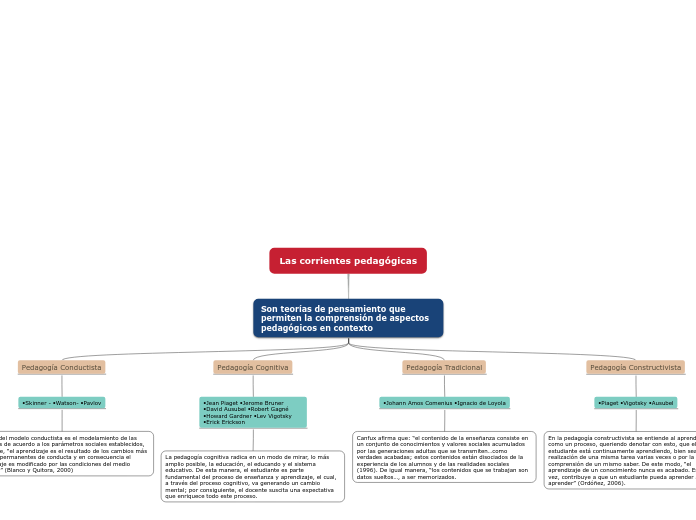によって Maria Alejandra Lopez Insuasty 5年前.
337
Las corrientes pedagógicas

によって Maria Alejandra Lopez Insuasty 5年前.
337

もっと見る
Type in the name of the multiple-perspectives text.
Example: Bridge to Terabithia by Katherine Paterson
Identify an important issue from the text that is being presented from different angles. Type it in.
Example: Jesse's drawing talent.
Decide on the fourth point of view
Type in the name of the last character whose perspective on the issue you are going to present.
Example: Leslie Burke, Jesse's new next-door neighbor, and best friend.
Point of view
Type in a relevant quote that highlights the character's point of view. Try to follow a citation format: author's name, chapter, and page.
Example: I can't get the poetry of the trees,' he said. She nodded. Don't worry,' she said. You will someday. He believed her.' (Paterson, 4. 24)
En la pedagogía constructivista se entiende al aprendizaje como un proceso, queriendo denotar con esto, que el estudiante está continuamente aprendiendo, bien sea por la realización de una misma tarea varias veces o por la comprensión de un mismo saber. De este modo, “el aprendizaje de un conocimiento nunca es acabado. Esto, a su vez, contribuye a que un estudiante pueda aprender a aprender” (Ordóñez, 2006).
How is the viewpoint introduced in the story?
Choose an answer:
Whose character does the third point of view belong to?
Type in his/her name.
Example: Mr. Aarons, Jesse's father.
What does the character think, say or do that suggests their perspective on the issue?
Type in a quote and try to maintain the citation format.
Example: 'He would like to show his drawings to his dad, but he didn't dare. (...) He'd thought his dad would be pleased. He wasn't. What are they teaching in that damn school? he had asked.' (Paterson, 2.8)
Canfux afirma que: “el contenido de la enseñanza consiste en un conjunto de conocimientos y valores sociales acumulados por las generaciones adultas que se transmiten…como verdades acabadas; estos contenidos están disociados de la experiencia de los alumnos y de las realidades sociales (1996). De igual manera, “los contenidos que se trabajan son datos sueltos…, a ser memorizados.
What kind of narration introduces the viewpoint?
Choose an answer:
Decide on the second point of view
Name the character (it can either be the main character or one of the supporting characters) whose point of view you are presenting.
Example: Miss Edmunds, Jesse's music teacher.
Type in a quote that points out the character's position about the issue.
Try to follow a citation format: author's name, chapter, and page.
Example: 'She said he was unusually talented, and she hoped he wouldn't let anything discourage him.' (Paterson, 2. 8)
La pedagogía cognitiva radica en un modo de mirar, lo más amplio posible, la educación, el educando y el sistema educativo. De esta manera, el estudiante es parte fundamental del proceso de enseñanza y aprendizaje, el cual, a través del proceso cognitivo, va generando un cambio mental; por consiguiente, el docente suscita una expectativa que enriquece todo este proceso.
How is the viewpoint introduced in the story?
Choose an answer:
Decide on the first point of view you are going to present.
Type in the name of the character (it can either be the main character or one of the supporting characters) whose point of view belongs to.
Example: Jesse Oliver Aarons, Jr., the main character of the novel, a fifth-grader living in a rural Southern area.
Type in a relevant quote that highlights the character's point of view towards
Son teorías de pensamiento que permiten la comprensión de aspectos pedagógicos en contexto.
Try following a citation format: author's name, chapter, and page.
Example: 'Jesse drew the way some people drank whiskey. (...) Lord, he loved to draw. (...) When he was in first grade, he told his father that he wanted to be an artist when he grew up.' (Paterson, 2. 7)
La meta del modelo conductista es el modelamiento de las conductas de acuerdo a los parámetros sociales establecidos, de allí que, “el aprendizaje es el resultado de los cambios más o menos permanentes de conducta y en consecuencia el aprendizaje es modificado por las condiciones del medio ambiente” (Blanco y Quitora, 2000)
What type of narration introduces the viewpoint?
Choose an answer: